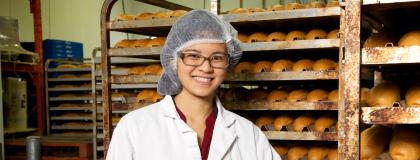
Food Science Co-op Information for Employers
Adding Value to Your Team
Food Science is an applied discipline that draws on all areas of science: chemistry, physics, engineering, biology and nutrition. Food scientists are involved in the transformation of raw agricultural products into various consumer products.
A tremendous amount of technical training is required to develop and formulate safe, nutritious foods, manufacture and package them, preserve their quality, and supply the consumer with a wide variety of menu items and snack foods.
In our state-of-the-art facilities, students will gain these technical competencies and will apply this knowledge to industrial processes.
University of Guelph Advantage
- The only accredited university Food Science program in Ontario
- A leader in this area since the start of the 20th century
Our co-op process responds to your needs. Employers can post, hire and interview throughout the semester and our students are available for 4 or 12 month work terms. The Experience Guelph hiring tool makes hiring Guelph co-op students easy!
Student Strengths
Collaboration
Experience working independently and on a team when completing assignments.
Deep Understanding
Strong analytical skills developed as students complete extensive research projects.
Communication
Effective communication abilities developed through oral presentations and report writing.
Food Science Co-op Work Term Schedule
| YEAR | FALL | WINTER | SUMMER |
|---|---|---|---|
| ONE | Academic | Academic | Off |
| TWO | Academic | Academic | Work |
| THREE | Academic | Academic | Work |
| FOUR | Work | Work | Off |
| FIVE | Academic | Academic |
Food Science Course Sequencing
Please see the current undergraduate calendar for more information.
Fall
- General Chemistry I
- Introduction to Molecular & Cellular Biology
- Elements of Calculus I
- Physics for Life Sciences
- 1 Liberal Education Elective
Winter
- Biological Concepts of Health
- General Chemistry II
- Elements of Calculus II
- Physics for Life Sciences II
- 1 Liberal Education Elective
Fall
- Introduction to Biochemistry
- Physical Chemistry
- Introduction to Nutritional and Food Science
- Introduction to Co-operative Education
- Introduction to Microbiology
- 1 Elective
Winter
- Communication in Food Science
- Food Engineering Principles
- Fundamentals of Nutrition
- Statistics I
- 1 Elective
Summer
Work Term One
Fall
- Food Chemistry I
- Food Processing I
- Food Microbiology
- 1 Elective
Winter
- Food Processing II
- Food Chemistry II
- Industrial Microbiology
- Sensory Evaluation of Foods
- 1 Elective
Summer
Work Term Two
Fall
Work Term ThreeWinter
Work Term FourSummer
Off
Fall
- Advanced Food Analysis
- Food Product Development I
- 3 Electives
Winter
- Food Product Development II
- 4 Electives
See Undergraduate Calendar for list of Restricted Electives
